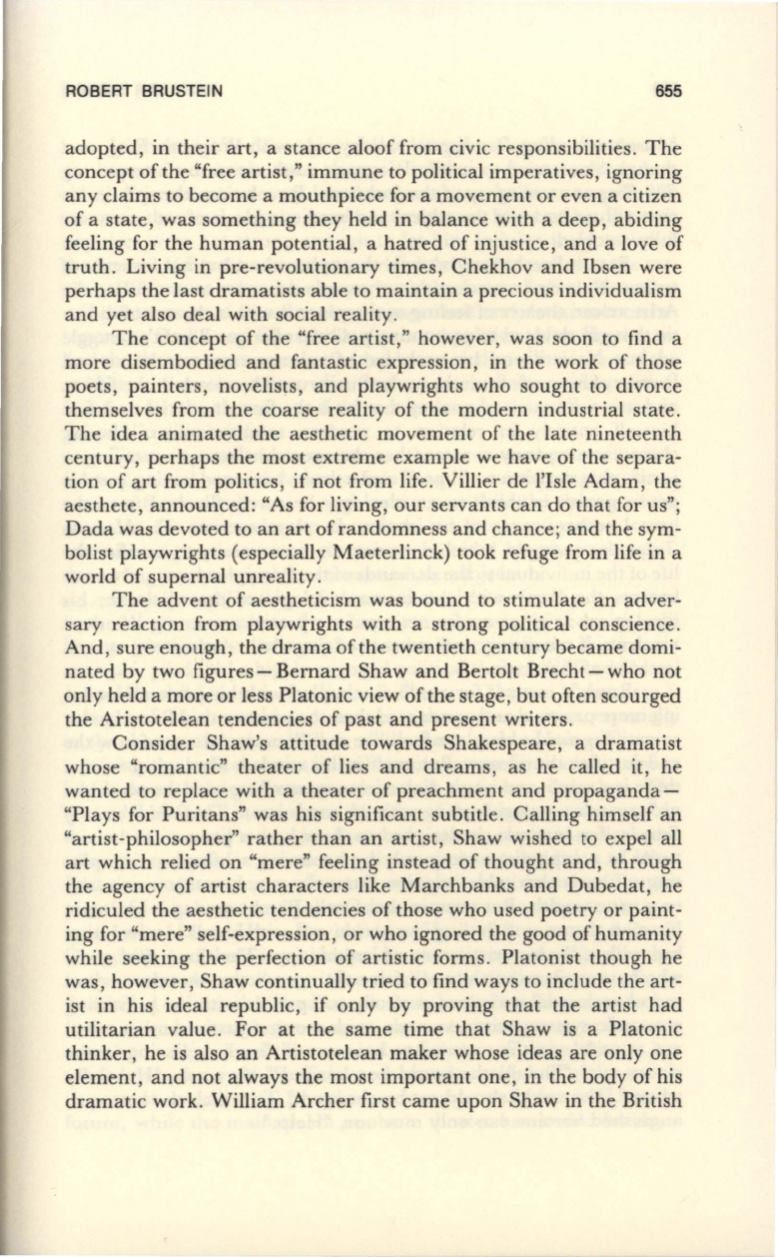
ROBERT BRUSTEIN
655
adopted, in their art, a stance aloof from civic responsibilities. The
concept of the "free artist," immune to political imperatives, ignoring
any claims to become a mouthpiece for a movement or even a citizen
of a state, was something they held in balance with a deep, abiding
feeling for the human potential, a hatred of injustice, and a love of
truth. Living in pre-revolutionary times, Chekhov and Ibsen were
perhaps the last dramatists able to maintain a precious individualism
and yet also deal with social reality.
The concept of the "free artist," however, was soon to find a
more disembodied and fantastic expression, in the work of those
poets, painters, novelists, and playwrights who sought to divorce
themselves from the coarse reality of the modern industrial state .
The idea animated the aesthetic movement of the late nineteenth
century, perhaps the most extreme example we have of the separa–
tion of art from politics, if not from life. Villier de l'Isle Adam, the
aesthete, announced: "As for living, our servants can do that for us";
Dada was devoted to an art of randomness and chance; and the sym–
bolist playwrights (especially Maeterlinck) took refuge from life in a
world of supernal unreality.
The advent of aestheticism was bound to stimulate an adver–
sary reaction from playwrights with a strong political conscience.
And, sure enough, the drama of the twentieth century became domi–
nated by two figures- Bernard Shaw and Bertolt Brecht- who not
only held a more or less Platonic view of the stage, but often scourged
the Aristotelean tendencies of past and present writers.
Consider Shaw's attitude towards Shakespeare, a dramatist
whose "romantic" theater of lies and dreams, as he called it, he
wanted to replace with a theater of preachment and propaganda–
"Plays for Puritans" was his significant subtitle. Calling himself an
"artist-philosopher" rather than an artist, Shaw wished to expel all
art which relied on "mere" feeling instead of thought and, through
the agency of artist characters like Marchbanks and Dubedat, he
ridiculed the aesthetic tendencies of those who used poetry or paint–
ing for "mere" self-expression, or who ignored the good of humanity
while seeking the perfection of artistic forms. Platonist though he
was, however, Shaw continually tried to find ways to include the art–
ist in his ideal republic, if only by proving that the artist had
utilitarian value. For at the same time that Shaw is a Platonic
thinker, he is also an Artistotelean maker whose ideas are only one
element, and not always the most important one, in the body of his
dramatic work. William Archer first came upon Shaw in the British


